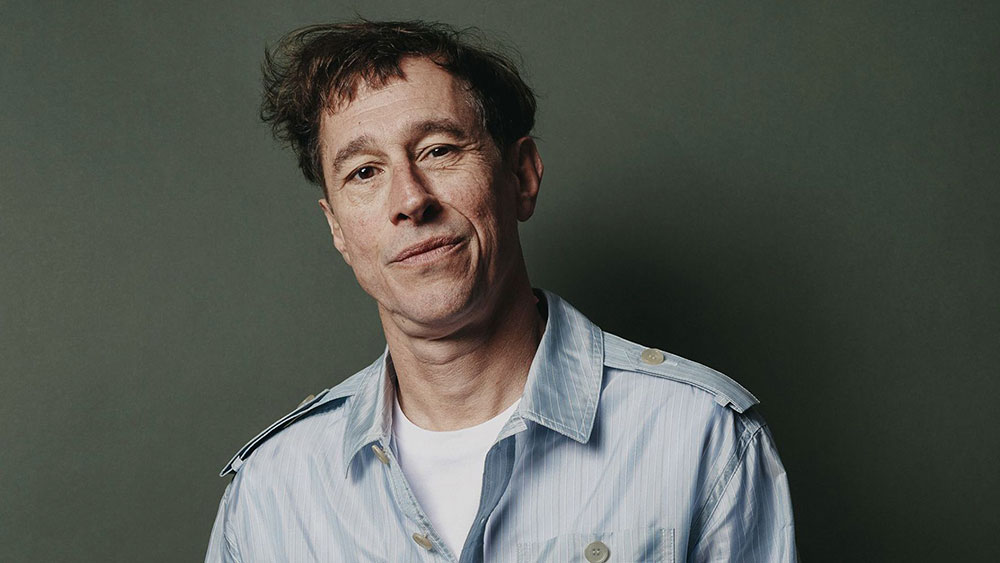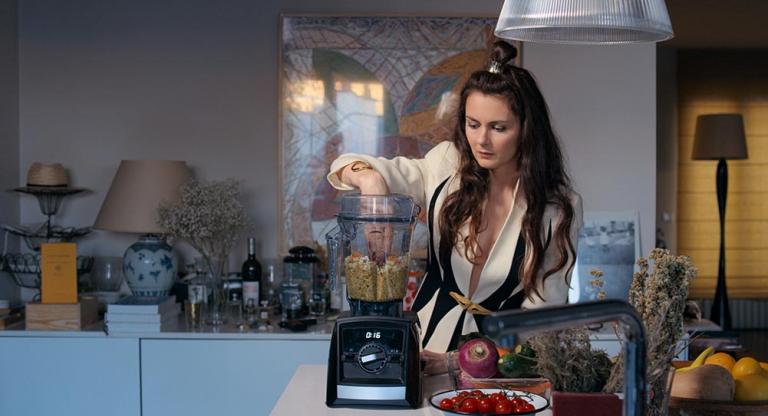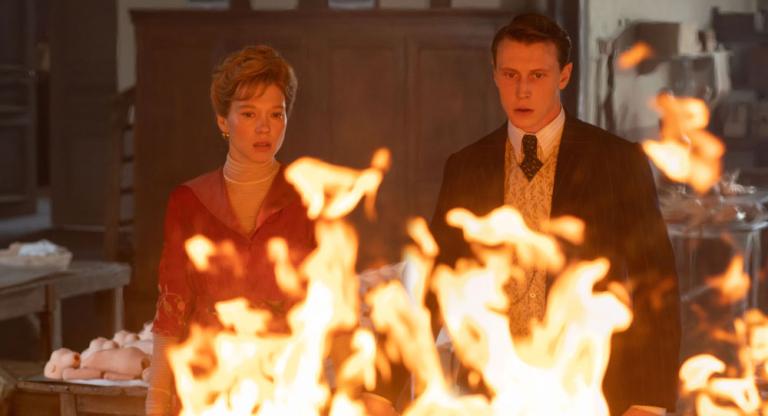To certain eyes it’s been long and abundantly clear that Bertrand Bonello is one of the world’s great contemporary filmmakers, a practitioner in the Carpenter-Cronenberg-Romero Holy Trinity of socio-political comment dressed with genre tones and astonishing formal control. Inasmuch as that reputation even exists, though, relies on the relative exposure of his work from 2011’s House of Tolerance onward—a bewildering run that encompasses Saint Laurent (2014), Nocturama (2016), Zombi Child (2019), and The Beast, which premiered at Venice last fall and is now playing in limited release from Janus and Sideshow. (Perhaps the best of these, 2022’s Coma, flew under the radar. Considering its deliriously galvanizing, evidently appealing blend of genre and form, this is both inexplicable and embarrassing. Coma is perhaps the defining portrait of our horrible decade, and—God bless—finally arrives in theaters this year through Film Movement.)
Bonello’s early films—a set comprising Something Organic (1998), The Pornographer (2001), Tiresia (2003), and On War (2008)—remain mostly underseen and undistributed. I was pleased to interview the director about his early career and its never-elucidated origins, which began as a dedicated musician (no surprise to aficionados of his original scores), includes run-ins with the most successful filmmaker to ever live, and ends with a major career shift marked by House of Tolerance, which has just been added to the Criterion Channel in a two-title series also featuring Nocturama.
As Bonello and I Zoomed between Paris and New York, I immediately took note of a cigarette-smoking doll over his shoulder.
Nick Newman: What is that behind you?
Bertrand Bonello: It's Cindy. It’s the doll that is in The Beast, in the Los Angeles part.
NN: That's fantastic.
BB: I adopted her.
NN: That's great. I hope she has a good home. The purpose of this interview is to cover your earlier films, which you’ve had very few—if any—English-language conversations on. Maybe these are the only questions you’ll field this month about Tiresia and The Pornographer. I found myself rewatching your filmography over the past week. Through The Film Stage, I hosted a 35mm House of Tolerance screening at the Roxy Cinema.
BB: Oh, I’ve heard about this screening. Yeah.
NN: Which ended up being, dare I say, kind of a huge hit. People really came out without having seen the film previously. The print looked unbelievable.
BB: In fact, I had a huge retrospective at the French Cinematheque, like, three weeks ago and they all screened on 35 if they could. So I rewatched, like, ten minutes of House of Tolerance on 35.
NN: How did that go?
BB: Really well. We always sold-out and it was great because when I was introducing it I asked, “Who is watching for the first time?” Most people raised their hands and there was a lot, a lot of young people.
NN: I asked the same question and got the same response, which was quite satisfying. It’s funny: I talked to you in 2015, when On War randomly got a U.S. release.
BB: Yeah.
NN: I revisited that conversation where you said—I had forgotten this and it startled me reading it again—at that point you tended to be disappointed with a lot of your films, or watching them was the experience of remembering what you wish you had done, wishing they had come out differently. So I’m glad 10 minutes of House of Tolerance was good.
BB: Yeah, I rewatched, like, ten minutes of every film during the retrospective, and I realized: for the audience it’s just films, but for you it’s part of your life. Your lifetime, you know? And it always brings me back to something personal of me doing the film. I never thought this way before this retrospective—I don't know why. It’s not only films; it’s really part of your life.
NN: Something I love about the films and doing research is that you don’t offer a world of biographical information. You don’t do interviews saying, “I was at this place in my life and did the film for this reason.” They seem to come right out of time. And I found an interview you did around the time of Saint Laurent where you describe your early years, which sounded fascinating: you grew up in the south of France in this large house with many rooms that had artists coming and going. Which almost suggests Sarah Winchester.
BB: Yeah.
NN: Even the house being called L’Apollonide and you eventually making a film with that title—somewhat telling. I’m curious how much that upbringing was essential to an artistic vocation, but also a personal perspective.
BB: Well… yes, it’s very essential, but it’s also a question of that period. I grew up in the ‘70s, in this house full of—yes—painters, philosophers, writers, whatever. Of course the real subject of everything was freedom. Because it was this period. The second thing is, “Tomorrow will be better than yesterday or today.” So of course you grow up with the idea of freedom and desire; desire can be possible. My daughter, she’s 20, and she’s grown with the idea that tomorrow will be worse than today, and it changes, of course, a lot about the desires and about the idea of freedom. That’s why I think freedom is one of my central subjects in all films. Lack of freedom, like in House of Tolerance; or desire and freedom, like in On War; or prison and fame, like Saint Laurent, which is a freedom also. It’s in all the films, this desire: how you inscribe yourself in the world. And that comes, I guess, from my childhood and all these conversations I had [during] this period, the atmosphere in this particular house.
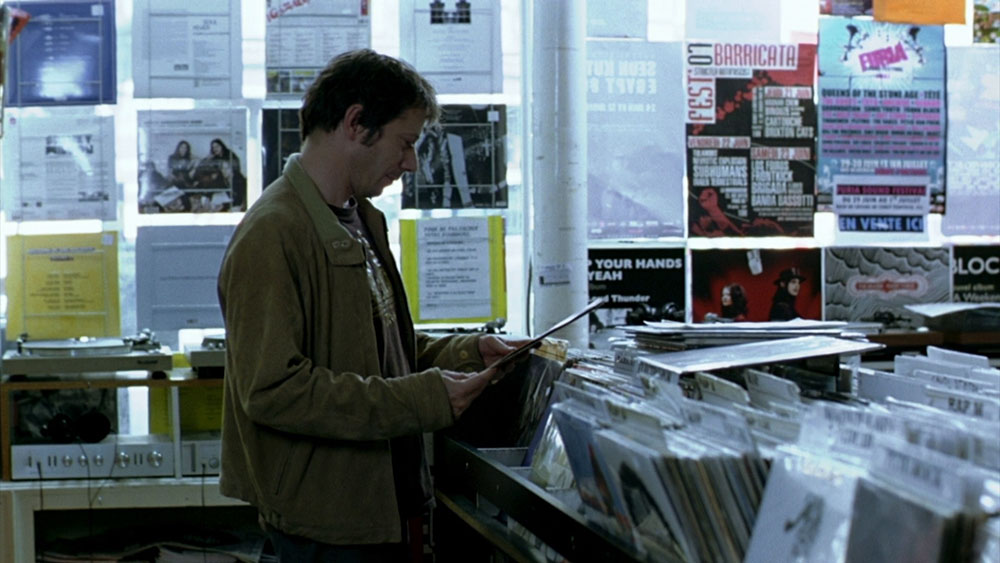
NN: And you were raised with more of a focus in music. You’ve said your mother, who worked in the opera, had you playing piano from the age of five.
BB: Yeah. Music was really my first work, first love, first job.
NN: You had a band—it initially had one name, but then you started calling it The Bonellos.
BB: [Laughs] Yeah, that’s true.
NN: Because you were trying to book a show and…
BB: When I was booking, they would say, “What name?” And I said “Bonello.” Everybody starts to call us “The Bonellos.” So it [Laughs] remained.
NN: There’s not much information on that time in your life or that music. How would you characterize the Bonellos’ sound?
BB: No, the group didn’t have a huge enough career to be remembered. It was a kind of mix of punk rock—really influenced by The Clash—and soul music. Bass, drums, and guitars, and some horns. But then most of my musical career was to be a session man. I started to work with other people in the studio or on stage. I did that for four or five years and I made a lot, a lot of money at that moment because there was so much money in the music business. It’s the early ‘90s, you know? So it was huge: you make three or four gigs a week, two studio sessions a week, and then I started to think that I would not do that all my life and I moved up to cinema without being a big cinephile. I just… guessed, tried something. [I had] an intuition that I would like that. And as I earned a lot of money with one tour, I saved half of my salary every night and I could pay myself—like, a short movie. That’s how I went into the movies. At that moment I started to watch four, five films a day to try to understand how you make films and read a lot of interviews of directors and DoPs.
NN: Looking back, do you think you really learned from that? It’s an odd method: no school, just reading and watching. Did you find yourself, when the time came to make a film, prepared for a lot of the minutia that goes into making a movie?
BB: It’s a weird preparation. But it is… one. Because if you watch a film and you say, “How can you do a film like this?” You see the scene again and you are looking for the interview of the director and sometimes he doesn’t say anything, sometimes he does. But, for example, the interviews of DPs taught me a lot. I was reading, a lot, American Cinematographer because their interviews are sometimes very, very amazing.
NN: I know you made a short film Qui je suis [Who I Am] which you somewhat recently screened. But you prefer to be present when it’s showing.
BB: Yes, I like to introduce the film—to say why I did it, what exactly is the book, when the book was written in Pasolini’s life. I think it’s better. I did a huge introduction at the Cinematheque and I think people really enjoyed the film better after that.
NN: So is that a film you think you’ll keep sequestered for the time being?
BB: I have a lot of rights problems on this film—especially music—so it cannot be commercialized.
NN: As someone who loves your music choices, can I ask what’s in it?
BB: Oh, you have a lot of classical music. Bach, John Lurie, and some stuff I did.
NN: You’ve said that by your late 20s you’d written a few scripts and a producer took particular interest in your script for Something Organic. That facilitated it becoming your first film. Do you remember what feeling went into that being the one to really catch someone’s attention? And I’m curious about the basic necessity of that being your first film because it simply received the most material support.
BB: Yeah, well… I didn’t know a lot about movies, but even less about movie business. I didn’t know anyone, in fact. And it was a pre-Internet period; it was difficult to connect to some reality. I was very, very innocent and very, very naïve—which has some good sides. So a lot of questions, I didn’t ask myself. Now, if I meet a young guy of 25 that wants to make films, they know everything. They know everything: how it works, what you have to write to have money from commission, who’s going to be in Cannes. They know everything. I was very, very different from that. So, for me, everything I could take was good.
For example, I shot my first movie in Poland and Steven Spielberg was preparing Schindler’s List—everyone was shooting in the same place—so I met him a few times in a cafeteria. And for me it was normal. “I make films. I met Steven Spielberg.” I was very, very naïve.
NN: How was that experience?
BB: Great! When you do something and you don’t know what the reality is… this naïve stuff has some good sides, you know? Of course, if I look back and think of it I say, “My God. I was really stupid.” But in the moment it’s just fantastic.
NN: Do you think he’s seen any of your films?
BB: [Laughs] I don’t think so. I don’t know if he’s seen… I know Martin Scorsese has seen quite a lot. But Martin watches films all day. [Laughs] I don’t know about Spielberg.
NN: You’ve talked to Scorsese—you guys did that panel at Cannes some years ago.
BB: Yes. We gave him a prize and I was doing the masterclass on stage with him, and we spent a couple of days together.
NN: I assume he likes your work.
BB: Yeah. He has a memory—crazy memory. He remembers the cuts in House of Tolerance and Saint Laurent. It’s crazy.
NN: I suppose it’s unlikely Spielberg is watching your films, but Mathieu Amalric did On War a few years after Munich, Elina Löwensohn is in Schindler’s List…
BB: Yeah, exactly.
NN: Rewatching Something Organic was fascinating. I forgot to what extent it’s your quietest film: it has the least music, it opens with an act of violence but it’s not that violent, there’s some sex but the sex is almost chaste. Do you think there’s a correlation with making your first film and making this, let’s say, slower step into some of your characteristic gestures?
BB: Well, Something Organic is a film I did with something like $100,000 and shot in 15 days. I guess some of the minimalist stuff comes, really, from that also. And also, you evolve because you’re growing, aging, because your relationship with the cinema of others changes. I think at that moment—if I remember clearly—I was very obsessed by Robert Bresson. So yes: a lot of silence and attention to sounds—precise sounds—leave space to the sound. I think that was part of my thinking.
NN: There is at least some fixation on music, though. You have two dance or “vibe-out” scenes in that movie’s first 12 minutes. Which begins an interesting trend in your oeuvre: there's trance-dance sequences in this, On War, Nocturama, Zombi Child… even Coma and The Beast have some fixation on the relationship between body and music. Or we can just call it “dancing,” if we want to. Anyway, can you locate where that dramatic interest comes from?
BB: I think it’s something that says a lot about a character or an actor. It’s something very intimate. When an actor or an actress does a dance in front of a camera, she or he gives a lot of himself. It’s more intimate than a sex scene, for me, and it says a lot about a character. For me, dancing scenes—and I know there are a lot in the films, even in The Beast—are sometimes better than some dialogue to say something about someone. You really choose the good music and put the actor in a good mood. He doesn’t have the choice not to give you something.
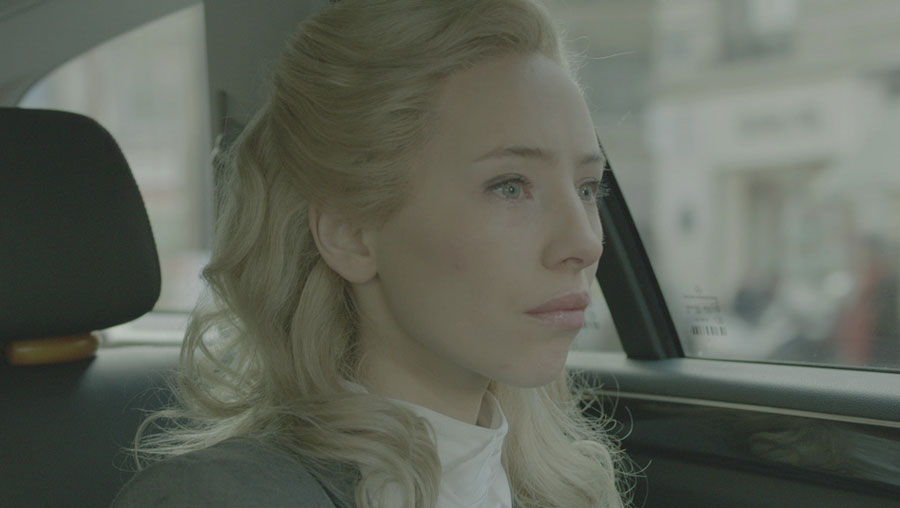
NN: Léa Seydoux dances at some point in all three of your movies together.
BB: Yes. Léa loves dancing. [Laughs] For example: The Beast, she dances twice, and the second time—when she comes into this club in LA—the way she danced said everything about what she had in mind. Much better than a dialogue.
NN: That arm-jerk she does is so… her character’s not a great dancer, per se, but it feels entirely real to what she would do. Eventually you get to The Pornographer. It was so much fun rewatching it last week. And it blew my mind because the first time I saw it I was 22 years old; now I’m about to turn 31 and the thought of being this age, now, making my second feature with Jean-Pierre Léaud is… insane. Did you have a similar feeling while doing that?
BB:. I was very happy and moved because when I presented The Pornographer in La Cinematheque a few weeks ago, Jean-Pierre came. It might have been his last public appearance—could be—so it was really moving to present the film with him. Of course, when I was shooting, I was a young filmmaker and he had already marked the history of cinema. But it was amazing that he never made me feel that. Because for him, whatever the age of the director, the director is God—he’s the father. Because he’s been taught that with the New Wave: the director is the one who knows. Even if I was much younger than him and young in my career, he was like a kid and I was like the father. It was quite weird.
NN: It’s bold to be that young and make a film about a fading, washed-up director while staging sequences from his camera’s POV. It’s like a young man imagining what it’s like to be old.
BB: I think the subject of the film, in fact, is what it is to be a son—politically, intimately, cinematographically. It’s just a question about the fathers. Because I was born in 1968 and this question was very important to me when I was a teenager: how are we going to exist after what our parents did?
This is probably the real subject of the film. So of course I identified myself to the son, to Jérémie Renier, and the more and more we were shooting the more I started to have an identification to Jean-Pierre; in fact, because there was such a strange and weird connection between us two. And the editing went more on his side than on the side, the point of view, of the son.
NN: The end credits of Tiresia, your next film, give thanks to Pedro Costa and Olivier Assayas. That opens a question I’ve wondered for a while: do you have much of a personal relationship with other filmmakers? Particularly in your country or your generation? You’ve spoken before about feeling more like a descendant of Eustache and Carax than Pialat and Desplechin—a fascinating way to characterize yourself, and one of the only times I’ve heard you place yourself in a continuum.
BB: No. Less and less, in fact. I don’t talk to many directors. I mean, we know each other and if there is, like, a party or something it’s nice to have a drink and talk a little, but... I don’t know why. I feel more and more lonely in French cinema, in the French universe. It’s okay; it’s just a feeling I have.
NN: The Beast seems like a slightly bigger release. But it hasn’t brought you closer to them.
BB: Yeah. I feel more and more lonely about the vision of cinema in France.
NN: Are there more relationships with musicians, then, because of your longer musical background?
BB: Um… not much. A little lately, in classical music, because I just did a big show in January at the Philharmonie with Schoenberg’s music. But for the last two or three years I spent all my time working, working a lot, so my relationships were with my partners.
NN: I rewatched House of Tolerance in the middle of this grand revisiting of your work. From an outsider’s perspective—not French, not a filmmaker—it does seem to represent a dividing point in your career. Your earlier films remain, in America, rather underseen. I think On War is the earliest that has any real distribution here, still. Do you think anything accounts for this? Do you see House as a dividing point in your career?
BB: Yes, clearly. For many reasons. It came after films that were difficult to make, that didn’t work. I turned 40, I think—maybe 42. There was a switch in my relationship with how to tell a story, how to use a form, how to use the mise-en-scène’s relationship with time and space. I changed a lot of things. From that moment—I don’t know why—my audience started to be younger. House of Tolerance is not a subject for young people, but its relationship with music, with editing—stuff like that. Of course it got even younger with Nocturama. Because before that, the first films—Pornographer, Tiresia—the audience was much older than me. Starting from House of Tolerance it started to be younger and younger. And The Beast: the audience in France is very young.
NN: Does that make you happy?
BB: Yes. I did a premiere in, I don’t know which city, in France—80% of the people were between 17 and 25.
NN: Well, you don’t want your audience to die off.
BB: Yeah, yeah! I’m not looking for that. It just happened.
NN: Your use of music has always amazed me. I don’t know how you do it, but…
BB: Because I think of it very early, during the writing process. Either which song is going to be played in the film—if it’s a club—it’s all in the script. Even the original score, if I write a scene and feel the scene needs some music, I stop writing, I go into my studio, and I start to record stuff. Then I go back to my office. So I try to include the music as much as I can inside… not the film, but already the script.
NN: Do you have any particular songs on a secret playlist that you’re hoping to use someday but haven’t yet found a place for?
BB: No. It goes the other way: I don’t put songs because I like them, but I need to find a song that says something about what is being written. But sometimes… for example, when I was writing House of Tolerance, I had this image of 12 girls dancing and crying to the Moody Blues. I had this image; it came like this. Then you have this scene in mind. You say, “Why did they cry? They cried because one of them died. Okay, why does she die? Because it's a sexual disease.”
NN: Years ago you attempted a Vertigo remake-of-sorts, Madeleine Among the Dead, that would’ve retold the story from the woman’s perspective, but rights issues prevented it. Is that an idea you still entertain?
BB: I loved the idea because Madeleine, she’s an image in the film. I love the idea to give her a life, a personality, feelings. But it’s something I wrote in 2007, maybe; it’s really the past now. It’s really the past.
NN: I still dream of seeing it someday.
BB: I should read it again, maybe.
The Beast is now playing at Film at Lincoln Center. Director Bertrand Bonello will be in attendance tonight for a Q&A following the 6 PM screening of the film.
